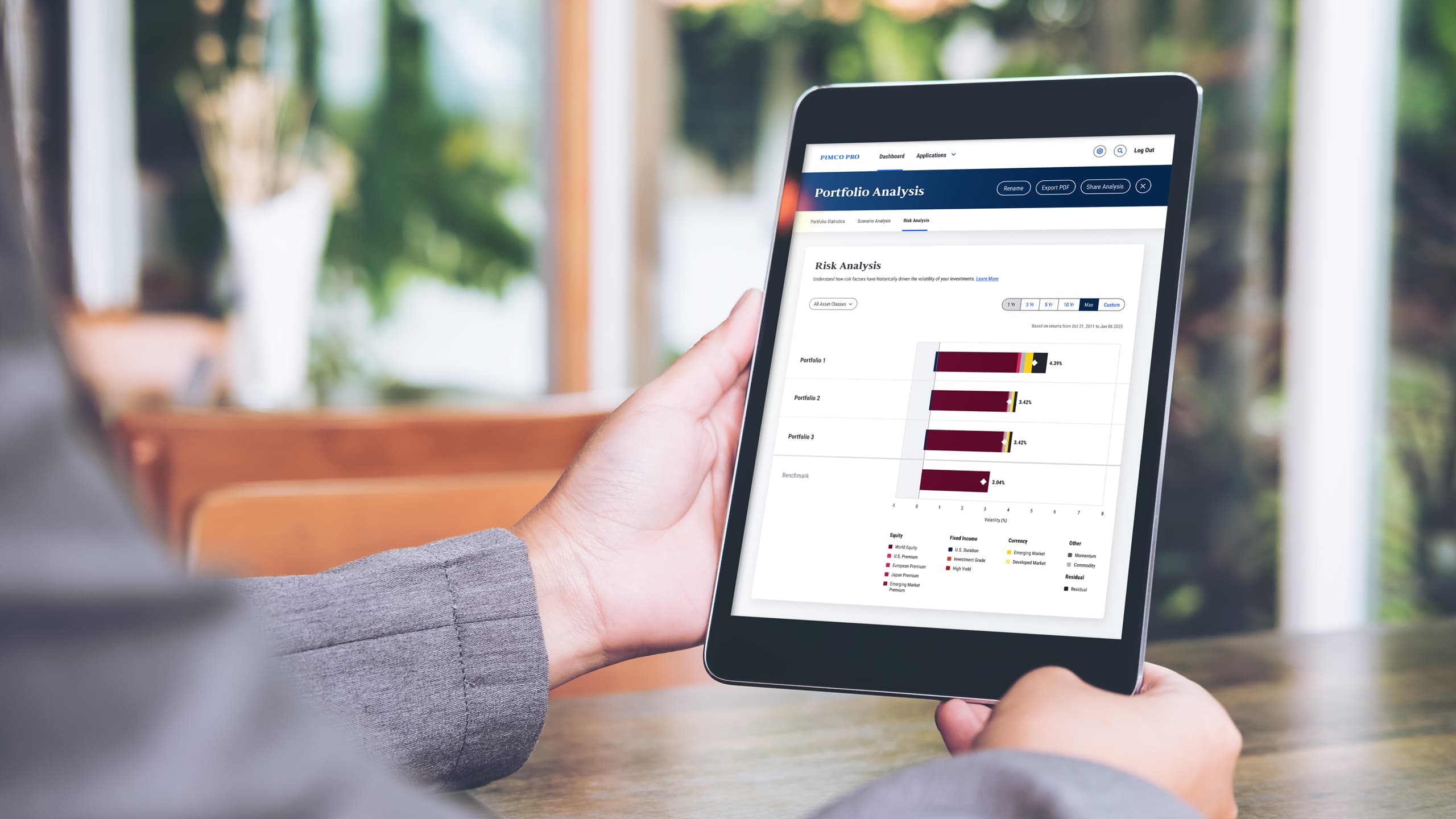Explore PIMCO's Credit Solutions

Seizing Opportunities in Every Environment
Diversifying Portfolios is Easy with Pro

How Can PIMCO Help You?
Investors should consider the investment objectives, risks, charges and expenses of the funds carefully before investing. This and other information are contained in the fund’s prospectus and summary prospectus, if available, which may be obtained by contacting your investment professional or PIMCO representative. Click here for a complete list of the PIMCO Funds prospectuses and summary prospectuses. Please read them carefully before you invest or send money.
Investments made by a Fund and the results achieved by a Fund are not expected to be the same as those made by any other PIMCO-advised Fund, including those with a similar name, investment objective or policies. A new or smaller Fund’s performance may not represent how the Fund is expected to or may perform in the long-term. New Funds have limited operating histories for investors to evaluate and new and smaller Funds may not attract sufficient assets to achieve investment and trading efficiencies. A Fund may be forced to sell a comparatively large portion of its portfolio to meet significant shareholder redemptions for cash, or hold a comparatively large portion of its portfolio in cash due to significant share purchases for cash, in each case when the Fund otherwise would not seek to do so, which may adversely affect performance.
Different fund types (e.g. ETFs, open-ended investment companies) and fund share classes are subject to different fees and expenses (which may affect performance). They may also have different minimum investment requirements and be entitled to different services.
Exchange Traded Funds (“ETF”) are afforded certain exemptions from the Investment Company Act. The exemptions allow, among other things, for individual shares to trade on the secondary market. Individual shares cannot be directly purchased from or redeemed by the ETF. Purchases and redemptions directly with ETFs are only accomplished through creation unit aggregations or “baskets” of shares. Shares of an ETF, traded on the secondary market, are bought and sold at market price (not NAV). Brokerage commissions will reduce returns. Investment policies, management fees and other information can be found in the individual ETF’s prospectus. Buying or selling ETF shares on an exchange may require the payment of fees, such as brokerage commissions, and other fees to financial intermediaries. In addition, an investor may incur costs attributed to the difference between the highest price a buyer is willing to pay to purchase shares of the Fund (bid) and the lowest price a seller is willing to accept for shares of the Fund (ask) when buying or selling shares in the secondary market (the bid-ask spread). Due to the costs inherent in buying or selling Fund shares, frequent trading may detract significantly from investment returns. Investment in Fund shares may not be advisable for investors who expect to engage in frequent trading. Current holdings are subject to risk. Holdings are subject to change at any time. An investment in an ETF involves risk, including the loss of principal. Investment return, price, yield and Net Asset Value (NAV) will fluctuate with changes in market conditions. Investments may be worth more or less than the original cost when redeemed. ETF shares may be bought or sold throughout the day at their market price on the exchange on which they are listed. However, there can be no guarantee that an active trading market for PIMCO ETF shares will develop or be maintained, or that their listing will continue or remain unchanged. Premium/Discount is the difference between the market price and NAV expressed as a percentage of NAV.
The PIMCO Flexible Credit Income Fund an unlisted closed-end fund. Limited liquidity is provided to shareholders only through the fund’s quarterly offers to repurchase between 5% to 25% of its outstanding shares at net asset value (subject to applicable law and approval of the Board of Trustees, the Fund currently expects to offer to repurchase 5% of outstanding shares per quarter). There is no secondary market for the fund’s shares and none is expected to develop. Investors should consider shares of the fund to be an illiquid investment. It is important to note that differences exist between the fund’s daily internal accounting records, the fund’s financial statements prepared in accordance with U.S. GAAP, and record keeping practices under income tax regulations. It is possible that the fund may not issue a Section 19 Notice in situations where the fund’s financial statements prepared later and in accordance with U.S. GAAP or the final tax character of those distributions might later report that the sources of those distributions included capital gains and/or a return of capital. Please see the fund’s most recent shareholder report for more details. The fund’s distribution rate may be affected by numerous factors, including changes in realized and projected market returns, fund performance, and other factors. There can be no assurance that a change in market conditions or other factors will not result in a change in the fund distribution rate at a future time. An investment in an interval fund is not suitable for all investors. Unlike typical closed-end funds an interval fund’s shares are not typically listed on a stock exchange. Although interval funds provide limited liquidity to investors by offering to repurchase a limited amount of shares on a periodic basis, investors should consider shares of the Fund to be an illiquid investment. Investments in interval funds are therefore subject to liquidity risk as an investor may not be able to sell the shares at an advantageous time or price. The Fund anticipates that no secondary market will develop for its shares. There is no guarantee that an investor will be able to tender all of their requested Fund shares in a periodic repurchase offer.
A Word about risk: Investing in the bond market is subject to risks, including market, interest rate, issuer, credit, inflation risk, and liquidity risk. The value of most bonds and bond strategies are impacted by changes in interest rates. Bonds and bond strategies with longer durations tend to be more sensitive and volatile than those with shorter durations; bond prices generally fall as interest rates rise, and low interest rate environments increase this risk. Reductions in bond counterparty capacity may contribute to decreased market liquidity and increased price volatility. Bond investments may be worth more or less than the original cost when redeemed. Contingent Convertible (“Coco”) Bonds are bonds that are converted into equity of the issuing company if a pre-specified trigger occurs. Co-cos are subject to a different type of risk from traditional bonds and may result in a partial or total loss of value or may be converted into shares of the issuing company which may also have suffered a loss in value. Investing in foreign-denominated and/or -domiciled securities may involve heightened risk due to currency fluctuations, and economic and political risks, which may be enhanced in emerging markets. Investing in senior loans, including bank loans, exposes the Fund to heightened credit risk, call risk, settlement risk and liquidity risk. Bank loans are often less liquid than other types of debt instruments and general market and financial conditions may affect the prepayment of bank loans, as such the prepayments cannot be predicted with accuracy. There is no assurance that the liquidation of any collateral from a secured bank loan would satisfy the borrower’s obligation, or that such collateral could be liquidated. Currency rates may fluctuate significantly over short periods of time and may reduce the returns of a portfolio. Mortgage and asset-backed securities may be sensitive to changes in interest rates, subject to early repayment risk, and their value may fluctuate in response to the market's perception of issuer creditworthiness; while generally supported by some form of government or private guarantee there is no assurance that private guarantors will meet their obligations. Inflation-linked bonds (ILBs) issued by a government are fixed-income securities whose principal value is periodically adjusted according to the rate of inflation; ILBs decline in value when real interest rates rise. Certain U.S. Government securities are backed by the full faith of the government, obligations of U.S. Government agencies and authorities are supported by varying degrees but are generally not backed by the full faith of the U.S. Government; portfolios that invest in such securities are not guaranteed and will fluctuate in value. Investing in foreign denominated and/or domiciled securities may involve heightened risk due to currency fluctuations, and economic and political risks, which may be enhanced in emerging markets. High-yield, lower-rated, securities involve greater risk than higher-rated securities; portfolios that invest in them may be subject to greater levels of credit and liquidity risk than portfolios that do not. Equities may decline in value due to both real and perceived general market, economic, and industry conditions. Derivatives and commodity-linked derivatives may involve certain costs and risks such as liquidity, interest rate, market, credit, management and the risk that a position could not be closed when most advantageous. Commodity-linked derivative instruments may involve additional costs and risks such as changes in commodity index volatility or factors affecting a particular industry or commodity, such as drought, floods, weather, livestock disease, embargoes, tariffs and international economic, political and regulatory developments. Investing in derivatives could lose more than the amount invested. Diversification does not ensure against loss.
Investments in distressed loans and bankrupt companies are speculative and the repayment of default obligations contains significant uncertainties. The value of real estate and portfolios that invest in real estate may fluctuate due to: losses from casualty or condemnation, changes in local and general economic conditions, supply and demand, interest rates, property tax rates, regulatory limitations on rents, zoning laws, and operating expenses. Structured products such as collateralized debt obligations are also highly complex instruments, typically involving a high degree of risk; use of these instruments may involve derivative instruments that could lose more than the principal amount invested. Derivatives may involve certain costs and risks such as liquidity, interest rate, market, credit, management and the risk that a position could not be closed when most advantageous. Investing in derivatives could lose more than the amount invested. The use of leverage may cause a portfolio to liquidate positions when it may not be advantageous to do so to satisfy its obligations or to meet segregation requirements. Leverage, including borrowing, may cause a portfolio to be more volatile than if the portfolio had not been leveraged.
There is no guarantee that these investment strategies will work under all market conditions or are appropriate for all investors and each investor should evaluate their ability to invest long-term, especially during periods of downturn in the market.
PIMCO as a general matter provides services to qualified institutions, financial intermediaries and institutional investors. Individual investors should contact their own financial professional to determine the most appropriate investment options for their financial situation. This material contains the current opinions of the manager and such opinions are subject to change without notice. This material has been distributed for informational purposes only. Information contained herein has been obtained from sources believed to be reliable, but not guaranteed. No part of this material may be reproduced in any form, or referred to in any other publication, without express written permission. PIMCO is a trademark of Allianz Asset Management of America L.L.C. in the United States and throughout the world.
PIMCO Investments LLC, distributor, 1633 Broadway, New York, NY 10019, is a company of PIMCO.
CMR2025-0729-4541231






